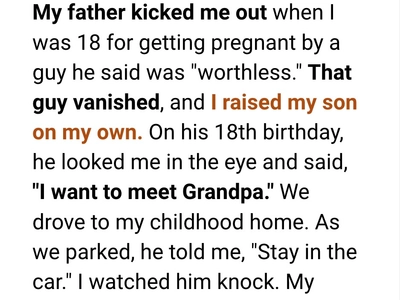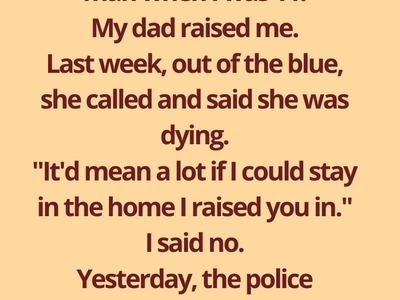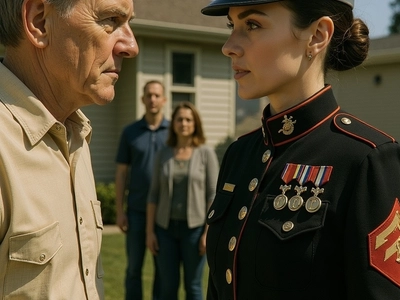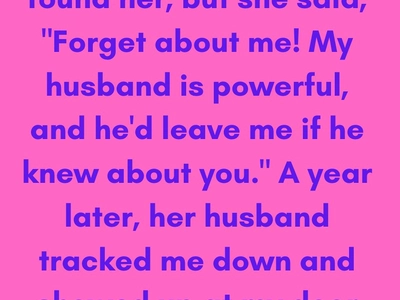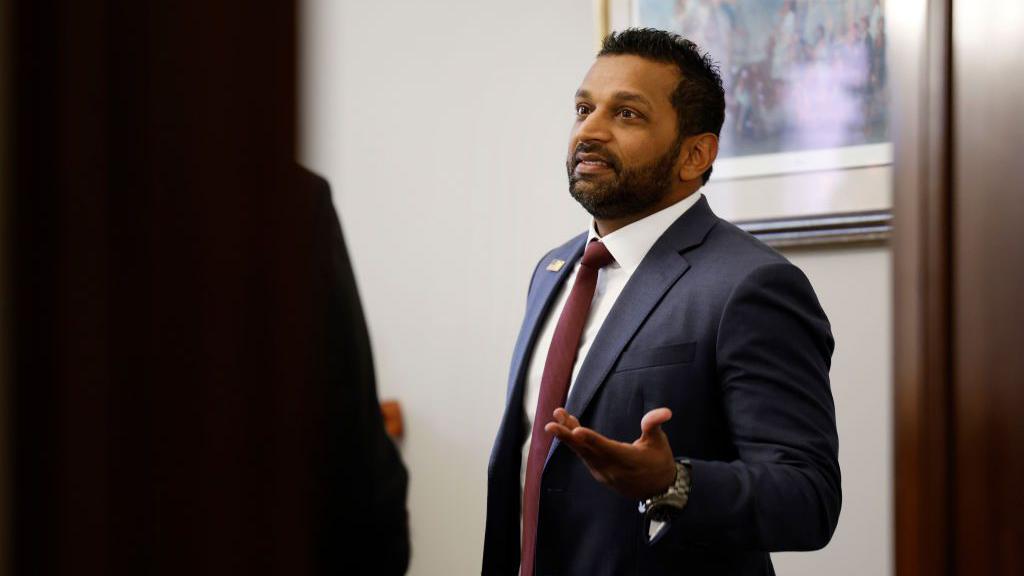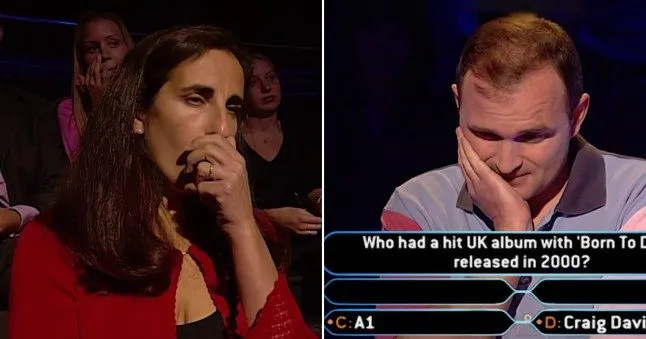The Day My Son Knocked on the Door That Once Closed on Me
When I was seventeen, the world as I knew it shattered in a single moment: I found out I was pregnant. My father ruled his home the way he ruled his auto garages — with discipline so sharp it cut through the air, with silence that spoke louder than any shout. Mistakes were not lessons in his world; they were sins. When I told him, I expected an explosion, maybe a storm of words or anger. Instead, he just stared at me. Then he walked to the front door, opened it, and said in a voice colder than winter, “Then go. Do it on your own.”
That was it. No hug, no question, no hesitation. Just a door opening and a life ending.
I stepped into the night carrying a duffel bag, a few dollars, and a thousand fears. Behind me was the only home I had ever known. Ahead of me was nothing but darkness — and inside me, a tiny heartbeat I could already feel changing everything. The baby’s father was gone before I even started to show. He stopped answering calls, stopped pretending he was ready for the kind of life neither of us had planned. It hurt, but I learned quickly that pain doesn’t stop the world from spinning. Survival became my only goal.
I worked days stocking shelves at a grocery store, nights cleaning offices that smelled like bleach and loneliness. I barely slept. I barely ate. But every time I felt that baby move, I whispered promises to him — that I’d never abandon him, that I’d never stop fighting, that I’d make sure he knew love even if the rest of the world didn’t offer any.
When my son was born, I named him Liam. And from that moment on, every breath I took belonged to him.
The years that followed were not kind. Our first apartment was a one-room box with cracked windows that rattled in the wind and a heater that coughed out more dust than warmth. I worked until my hands blistered, until my knees ached, until my back screamed for rest. But I never complained, because when I looked at Liam — his bright eyes, his curious grin — I knew that every ounce of exhaustion was worth it.
We learned together how to make something out of nothing. I patched his clothes with old fabric scraps, and he called the stitched patterns “battle scars.” I skipped meals so he wouldn’t have to. I told him stories before bed, stories about strength and second chances, and I made sure he grew up believing that hard work could turn even the roughest life into something beautiful.
By the time Liam was fifteen, he was already working part-time at a local garage. The first time I saw him under the hood of a car, grease streaked across his face, concentration written all over him, I had to turn away before he caught me crying. He had his grandfather’s steady hands, his precision, that same mechanical instinct — but his heart was all his own.
At seventeen, customers were asking for him by name. He was saving money, talking about his dreams, building something that looked a lot like hope. On his eighteenth birthday, I baked him a cake — chocolate, his favorite — and handed him a small gift box. He smiled, thanked me, and then, as we sat eating, he said something that made my chest tighten.
“Mom,” he said, “I want to meet Grandpa.”
I froze. The fork slipped from my hand and hit the plate with a small, sharp sound. It had been eighteen years since I’d last seen my father. He had never called, never written, never asked about his grandson. I had told myself he didn’t care, and I’d made peace with that lie.
“Why?” I asked quietly.
Liam shrugged. “I don’t need revenge,” he said. “I just need to look him in the eye.”
It was strange, hearing him say that without anger. There was no bitterness in his voice, no hatred — just a calm determination. He wasn’t looking for closure. He was looking for understanding.
We drove there that evening. The sun was sinking behind the rooftops, painting the sky in gold and pink, the same sky that had watched me walk away from that house eighteen years before. The driveway was cracked, the porchlight still humming with that same faint buzz I remembered. Every step toward that door felt like walking back into a memory I’d tried to bury.
When my father opened the door, his face froze. For a second, he looked older than I remembered — smaller somehow, like life had finally managed to chip away at the walls he’d built. Then he saw Liam standing beside me, tall and sure, and confusion turned to something softer. Recognition, maybe.
Liam stepped forward and held out a small white box. “It’s my birthday,” he said quietly. “I brought cake.”
Inside the box was a single slice of chocolate cake. Simple, sweet, and symbolic. My father took it with trembling hands, as if the gesture weighed more than he could hold.
Before he could say anything, Liam spoke again. “I forgive you,” he said. “For what you did to my mom. For what you didn’t do for me.”
The silence that followed was unbearable. The air seemed to thicken. I wanted to speak, to defend myself, to shout or cry, but I couldn’t move. My father’s lips parted, but no sound came out. He just stood there, holding that box, eyes flicking between me and the boy who carried his blood.
Liam continued, his voice steady but kind. “Next time I knock,” he said, “it won’t be with cake. It’ll be as your competitor. I’m opening my own garage — not because I hate you, but because you taught me to do it alone.”
For the first time in my life, I saw my father’s expression crack. He didn’t speak, but his eyes shimmered with something I’d never seen before — regret.
We walked back to the car in silence. The evening air was cool, and the streetlights had started to flicker on. My hands were shaking as I gripped the steering wheel. I didn’t even start the car at first. I just sat there, trying to breathe.
Then Liam turned to me, calm as ever, and said, “I forgave him, Mom. Maybe it’s your turn.”
That sentence hit harder than any words I’d ever heard. I had spent nearly two decades building a life out of broken pieces, holding on to pride and pain like armor. Forgiveness had never felt like an option. But in that moment, watching my son — the same boy I’d raised through sleepless nights and empty cupboards — I realized that he had already built what I’d spent years trying to find. Peace.
Driving home, I kept thinking about my father’s face, about the silence that had followed Liam’s words. I wondered if he understood the gift he’d been given — a forgiveness he didn’t deserve but received anyway. Maybe he’d think about it tonight, sitting alone at his table with that slice of cake. Maybe he’d remember the girl he’d cast out, now standing taller than the weight of his judgment.
Life didn’t turn into a fairy tale after that. Liam didn’t suddenly have a doting grandfather, and I didn’t wake up free from all the old hurt. But something had changed. The anger I’d carried for years started to fade, just a little. The space it left behind filled with something quieter — gratitude, maybe.
Liam worked harder than ever after that day. He opened his own garage within two years. The place was small at first, with a rusted sign and secondhand tools, but it was his. He painted the walls white, hung up photos of us — one of me holding him as a baby, another of him grinning with his first car project. When the first customer walked through that door, he called me just to say, “Mom, we did it.”
And I cried. Not because of pride, but because he said we.
Sometimes I still drive past my father’s old house. The porchlight still hums. I don’t stop, but I don’t speed past anymore either. Once, I saw him outside, sweeping the porch. He looked up and saw my car. We didn’t wave. We didn’t need to. There was something unspoken there — a quiet acknowledgment that time had softened what anger could not.
Liam kept his promise. Years later, he expanded his garage into two more locations. People knew his name across town. “Liam’s Auto” became known for honesty, precision, and kindness — three things I once thought couldn’t exist together. He hired young mechanics who reminded him of himself at fifteen, giving them chances no one had given me.
When a local newspaper did a story on his success, they asked him what inspired him to start his business. He smiled and said, “My mom taught me everything I needed to know — not about cars, but about life.”
I still have that article pinned to my kitchen wall. It reminds me that the story I once thought was ruined had simply taken a different road.
Sometimes at night, I think back to that moment at seventeen — the cold air, the open door, my father’s voice telling me to go. I used to replay it as the beginning of my downfall. Now I see it differently. That was the moment I was set free. Not gently, not kindly, but completely. Because being thrown out forced me to build a world that was mine, a world where love wasn’t conditional and forgiveness wasn’t weakness.
Liam and I visit that same driveway once a year now. Not to talk, not to argue — just to leave something small on the porch. The first time, it was another slice of cake. The next year, a photo of Liam’s first garage. The last time, we left a note that simply said, “Thank you for teaching us how to stand on our own.”
I don’t know if my father ever reads them. Maybe he does. Maybe he just throws them away. But it doesn’t matter. Those gestures aren’t for him anymore. They’re for us — reminders of how far we’ve come, how deep our roots grew despite being cut down.
Life is strange that way. The things that break you can also be the things that shape you. The people who abandon you can, without knowing it, teach you how to never abandon yourself. And sometimes the pain you think will destroy you ends up building someone stronger — someone who can stand in front of the past, forgive it, and move on.
My son did what I couldn’t do for so long. He looked at the man who broke our family and saw not a villain, but a lesson. He found peace where I found pain. And through his eyes, I finally saw it too — that forgiveness isn’t about excusing what happened; it’s about freeing yourself from it.
I once thought my story ended the night my father told me to leave. Now I know that was only the first chapter. The rest of the story — the real story — began the moment I refused to give up, the moment I chose love over anger, the moment my son was born.
We didn’t just survive being thrown away. We rebuilt everything we lost, one day at a time, until our lives no longer looked like tragedy but like triumph. The world had tried to close a door on us, but my son — the boy who learned forgiveness before I could — knocked again. And in doing so, he opened something much greater.
He opened the future.
